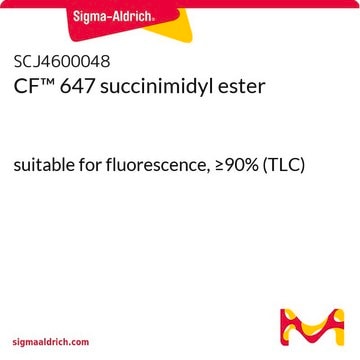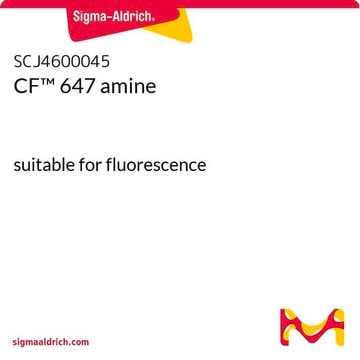Recommended Products
packaging
pkg of 1 kit
manufacturer/tradename
Cytiva PA25001
storage condition
protect from light
color
Blue
storage temp.
2-8°C
General description
Cy5 Mono-Reactive Dye Pack
Cy5 mono-Reactive Dye Pack
• Convenient way to label antibodies, proteins, drugs, and oligonucleotides with CyDye™ Fluorescent Dyes.
• For use in ELISA, immunoprecipitation, and blotting applications.
• Dyes are packaged in premixed amounts and foil-sealed to ensure consistent labelings.
Contains derivatized CyDye™ that carries only one reactive group on each dye molecule for accurate labeling of amine groups, for example on antibodies or oligonucleotides.
Each kit contains five vials of dye. Each vial is sufficient for labeling 1 mg of protein or 30 nmol of amino groups.
Cy5 mono-Reactive Dye Pack
• Convenient way to label antibodies, proteins, drugs, and oligonucleotides with CyDye™ Fluorescent Dyes.
• For use in ELISA, immunoprecipitation, and blotting applications.
• Dyes are packaged in premixed amounts and foil-sealed to ensure consistent labelings.
Contains derivatized CyDye™ that carries only one reactive group on each dye molecule for accurate labeling of amine groups, for example on antibodies or oligonucleotides.
Each kit contains five vials of dye. Each vial is sufficient for labeling 1 mg of protein or 30 nmol of amino groups.
Application
For the labelling of biological compounds with Cy5 monofunctional dye.
Storage and Stability
Please be aware this product may be shipped 90 days before the expiration date. For more information on the batch specific expiration date, please contact technical service.
Analysis Note
To view the Certificate of Analysis for this product, please visit www.cytiva.com.
Legal Information
CyDye:
Cy3B: This product is manufactured under an exclusive license from Carnegie Mellon University and is covered by US patent number 6,133,445 and equivalent patents and patent applications in other countries.
CyQ (or Cy5Q or Cy7Q): These products are covered under US patent number 6,828,116 and equivalent patents and patent applications in other countries in the name of Cytiva.
CytoCy5S: The use of this product in an NTR gene reporter assay is the subject of US patent number 7,579,140 in the name of Cytiva.
CypHer5E: This product or portions thereof is manufactured under license from Carnegie Mellon University and is covered by US patent number 7,615,646.
Cy and CyDye, are - trademarks of Cytiva or one of its subsidiaries.
The purchase of CyDye products includes a limited license to use the CyDye products for internal research and development but not for any commercial purposes. A license to use the Cy and CyDye trademarks for commercial purposes is subject to a separate license agreement with Cytiva. Commercial use shall include:
1. Sale, lease, license or other transfer of the material or any material derived or produced from it.
2. Sale, lease, license or other grant of rights to use this material or any material derived or produced from it.
3. Use of this material to perform services for a fee for third parties, including contract research and drug screening.
If you require a commercial license to use the Cy and CyDye trademarks please contact LSlicensing@cytiva.com.
If you require a commercial license to use this material and do not have one, return this material unopened to Cytiva Bio-Sciences AB, Bjorkgatan 30, SE-751 84 Uppsala, Sweden and any money paid for the material will be refunded.
Cy3B: This product is manufactured under an exclusive license from Carnegie Mellon University and is covered by US patent number 6,133,445 and equivalent patents and patent applications in other countries.
CyQ (or Cy5Q or Cy7Q): These products are covered under US patent number 6,828,116 and equivalent patents and patent applications in other countries in the name of Cytiva.
CytoCy5S: The use of this product in an NTR gene reporter assay is the subject of US patent number 7,579,140 in the name of Cytiva.
CypHer5E: This product or portions thereof is manufactured under license from Carnegie Mellon University and is covered by US patent number 7,615,646.
Cy and CyDye, are - trademarks of Cytiva or one of its subsidiaries.
The purchase of CyDye products includes a limited license to use the CyDye products for internal research and development but not for any commercial purposes. A license to use the Cy and CyDye trademarks for commercial purposes is subject to a separate license agreement with Cytiva. Commercial use shall include:
1. Sale, lease, license or other transfer of the material or any material derived or produced from it.
2. Sale, lease, license or other grant of rights to use this material or any material derived or produced from it.
3. Use of this material to perform services for a fee for third parties, including contract research and drug screening.
If you require a commercial license to use the Cy and CyDye trademarks please contact LSlicensing@cytiva.com.
If you require a commercial license to use this material and do not have one, return this material unopened to Cytiva Bio-Sciences AB, Bjorkgatan 30, SE-751 84 Uppsala, Sweden and any money paid for the material will be refunded.
Cy is a registered trademark of Cytiva
CyDye is a trademark of Cytiva
Signal Word
Danger
Hazard Statements
Precautionary Statements
Storage Class Code
13 - Non Combustible Solids
Certificates of Analysis (COA)
Search for Certificates of Analysis (COA) by entering the products Lot/Batch Number. Lot and Batch Numbers can be found on a product’s label following the words ‘Lot’ or ‘Batch’.
Already Own This Product?
Find documentation for the products that you have recently purchased in the Document Library.
Customers Also Viewed
Aravinth Kumar Jayabalan et al.
Proceedings of the National Academy of Sciences of the United States of America, 118(6) (2021-02-07)
While biomolecular condensates have emerged as an important biological phenomenon, mechanisms regulating their composition and the ways that viruses hijack these mechanisms remain unclear. The mosquito-borne alphaviruses cause a range of diseases from rashes and arthritis to encephalitis, and no
Samir Rahman et al.
Nucleic acids research, 45(6), 3017-3030 (2016-12-10)
Enhancers are intergenic DNA elements that regulate the transcription of target genes in response to signaling pathways by interacting with promoters over large genomic distances. Recent studies have revealed that enhancers are bi-directionally transcribed into enhancer RNAs (eRNAs). Using single-molecule
Our team of scientists has experience in all areas of research including Life Science, Material Science, Chemical Synthesis, Chromatography, Analytical and many others.
Contact Technical Service








